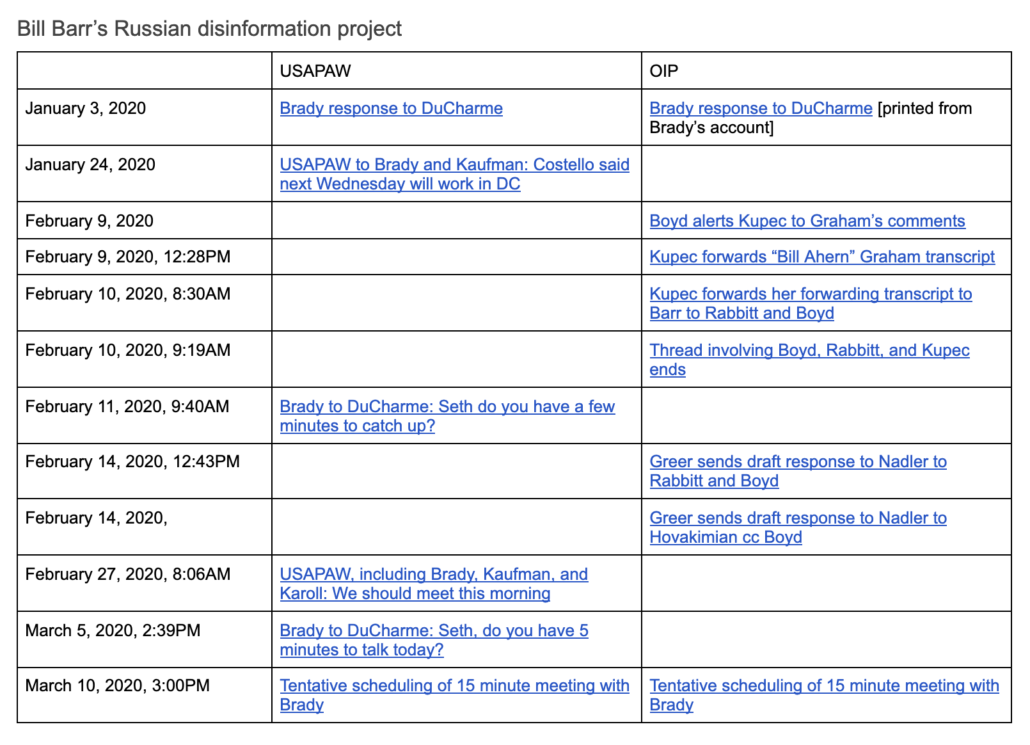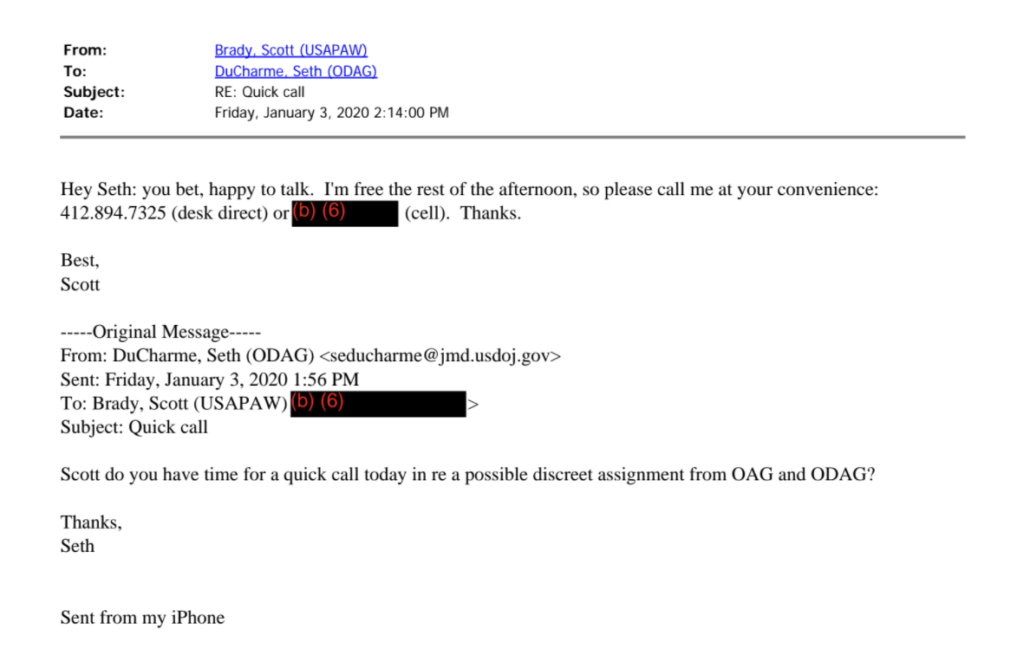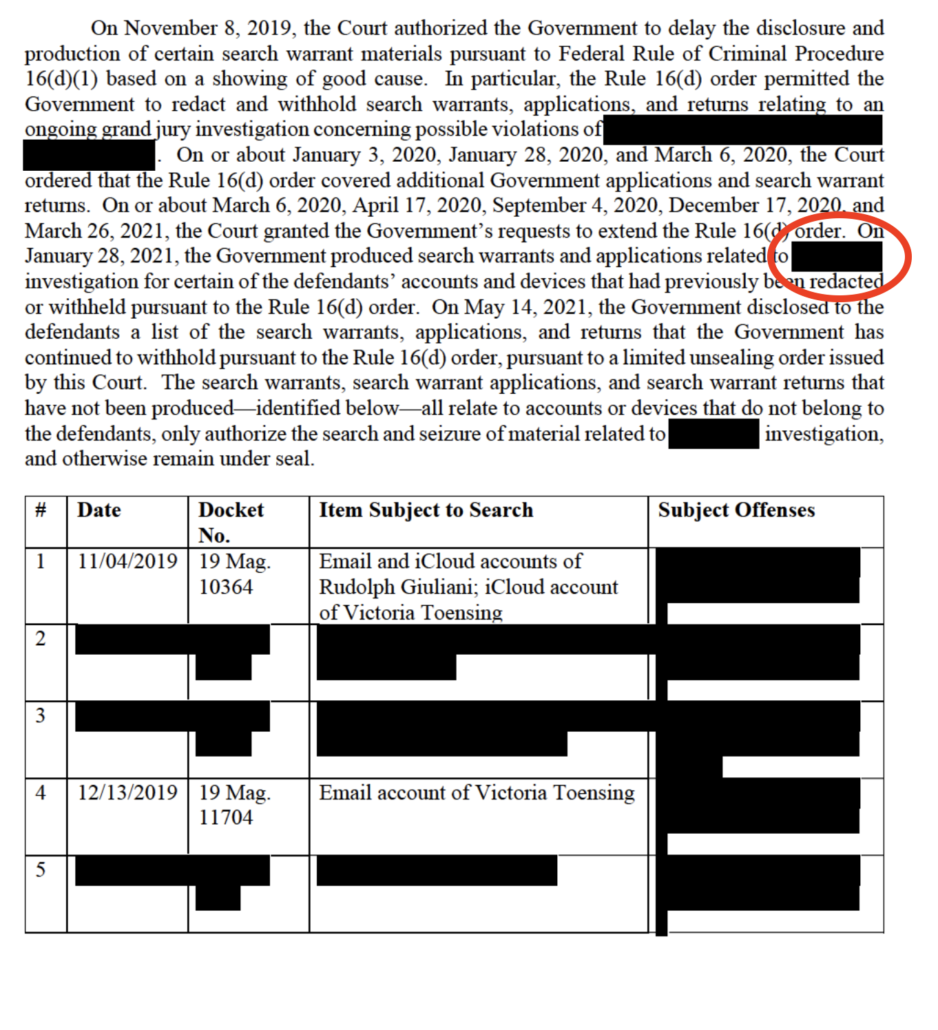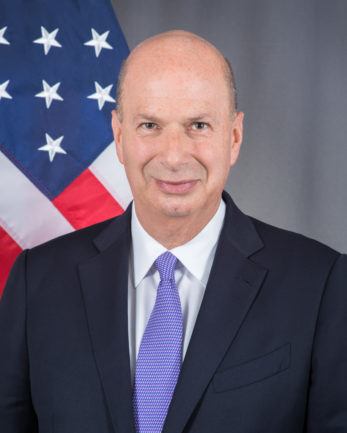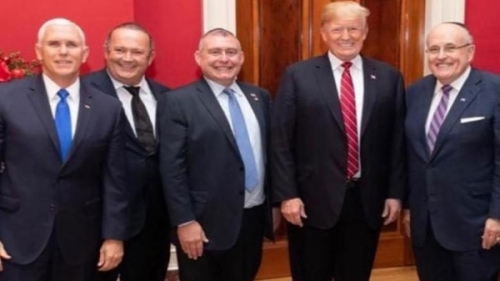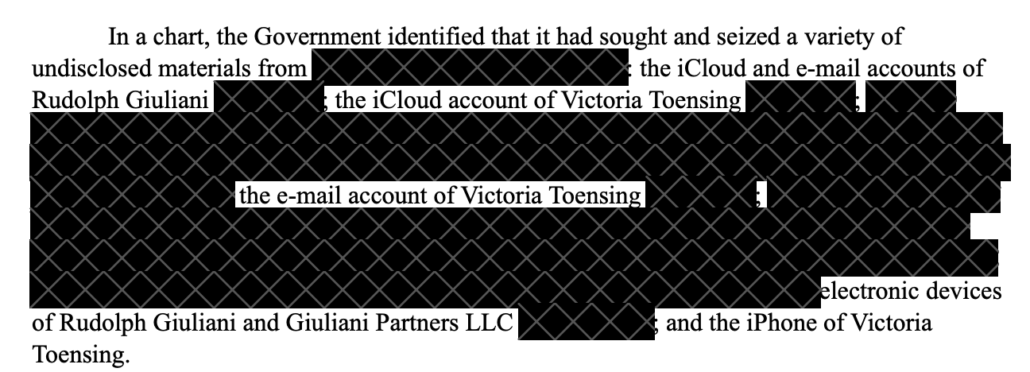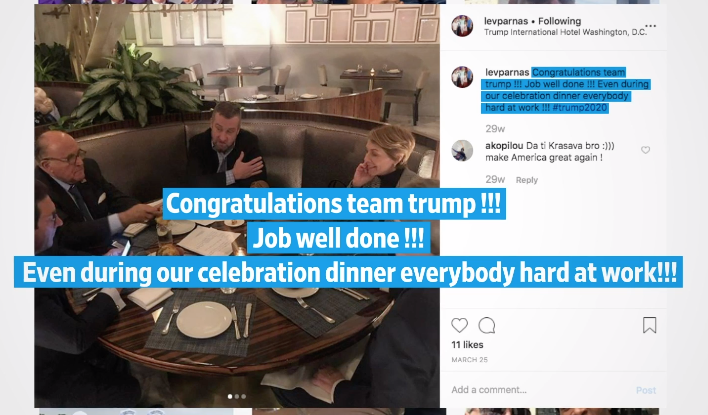Barbara Jones’ Special Mastery of Releasing Donald Trump’s Lawyers’ Crime-Fraud Excepted Communications
I knew Rudy Giuliani was in trouble when I read him — along with his lawyer Robert Costello, who allegedly tried to bribe Michael Cohen with a pardon in the wake of an SDNY seizure of his phones — claim that SDNY had first accessed Michael Cohen’s communications after SDNY seized Cohen’s phones in a search of his house and office.
In April 2018, the Government was in this exact same position it is in now in dealing with seizures made from the personal attorney to the President. This is now the second dawn raid of the office and home of an attorney for then President Trump. A year before they searched Giuliani’s iCloud account in November 2019, they were dealing with the raid of Michael Cohen’s home and law office. In Cohen v. United States, 18-mj-3161 (KMW), after conducting a search of President Trump’s personal lawyer’s home and law office, the Government opposed the appointment of a Special Master in a letter to the Court dated April 18, 2018. Counsel for Michael Cohen and intervening counsel for President Trump both requested that a Special Master be appointed and that the Special Master review the evidence, but only after counsel for the respective parties had reviewed the evidence and made their own claims of privilege. On the day of a scheduled conference to decide the issue, the Government, in a letter to Judge Wood, withdrew their opposition to the Special Master, but requested that the Special Master, and not defense counsel, review all the evidence and make the initial determinations of privilege. Judge Wood adopted the compromise and appointed a Special Master to review all materials. One of the Government’s counsel that signed that letter is counsel on this matter as well.
As a result, the Government was well aware that it had agreed to a Special Master in a case involving claims of attorney-client and executive privilege regarding the search and seizure of an attorney’s home and office when that attorney was the personal attorney for the President of the United States. Here, when faced with the exact same situation in November 2019, the Government decided on its own, to use its own Taint Team to sift through all of the evidence gathered and decide what materials were privileged. To make matters worse, not only was Giuliani not informed about this practice, but the Government also continued to keep him, the President and his counsel in the dark for 18 months while Giuliani cooperated with another office of the United States Attorney. Based on its experience in the Cohen case, the Government knew better, or should have known better, that it should not make unilateral, uninformed secret decisions about privilege, but clearly threw caution to the wind in its attempt in this investigation in search of a crime.
Was it really possible, I asked myself, that the President’s own lawyer, as well as the President’s lawyer’s lawyer, had no idea that Mueller’s team had obtained Michael Cohen’s Trump Organization emails from Microsoft with an August 1, 2017 warrant, content which they later shared with SDNY? Was it really possible, I wondered, that Rudy and Costello didn’t know that Mueller also obtained Cohen’s Google and iCloud content, obtained a non-disclosure order for it, and then later passed it on to SDNY, which obtained a separate warrant to access it? Did they not know that that process started 8 months before SDNY raided Cohen’s home and office and took his devices, which then led to the appointment of Special Master Barbara Jones? Did they really not know that SDNY first obtained Cohen’s content with some covert warrants, reviewed that information with the use of a filter team, and only after that got some of the very same information by seizing Cohen’s phones, only with the later seizure, used a Special Master to sort out what was privileged and what was not?
After the government’s reply, I thought for sure they’d start to cop on. I figured Rudy and Costello — who collectively, allegedly tried to bribe Cohen’s silence about the crimes he had committed while purportedly providing legal representation for Donald Trump — would understand the significance of this passage of the government reply:
Giuliani also analogizes this case to Cohen, suggesting that the Government should have known to use a special master because it had just agreed to use one in that case. (Giuliani Ltr. at 11). But Cohen favors an opposite conclusion: there, as here, the Government first obtained covert search warrants for accounts belonging to the subject. The returns of those covert warrants were reviewed by a filter team—a process which was not challenged. Although Judge Wood ultimately appointed a special master in Cohen, she repeatedly made clear her view that the use of a filter team was acceptable and was consistent with the substantial body of law in this Circuit. (See, e.g., Cohen, Dkt. 38 at 8). However, based on the unique circumstances of the case—Cohen’s principal and perhaps only client was then the President, and the case was subject to significant public attention—Judge Wood believed, and the Government agreed, that the use of a special master was needed for the “perception of fairness, not fairness itself.” (Cohen, Dkt. 104 at 88). But even after appointing a special master, Judge Wood continued to recognize the appropriateness of the use of a filter team: at the end of the special master’s review, there was one cellphone that had not been decrypted, and Judge Wood ordered that the if the cellphone was ultimately extracted, the privilege review could be conducted by the Government’s filter team. (Cohen, Dkt. 103 at 6). Thus, following Cohen, it was entirely appropriate for the Government to use a filter team during the covert phase of its investigation, but in light of the intense public interest in this matter following the overt execution of the 2021 Warrants, the Government agrees that while the appointment of a special master is not necessary for fairness, it is in the interest of ensuring that the privilege review process is perceived as fair.
But I didn’t write up the implications of that yet, because I figured there was still something that might save Rudy and Victoria Toensing. Maybe they’d pick a Special Master who would apply dramatically different rules than Special Master Barbara Jones had with Cohen, particularly an approach that said Cohen and Trump could claim privilege and hide the content, but any legal argument about that privilege had to be public. Surely they would be smart enough not to pick Jones, right? Surely, I thought, Rudy and Costello wouldn’t be dumb enough to be lulled into agreeing to appoint Jones herself, perhaps based on a false sense of confidence that since she works at Rudy’s former firm, she’ll go easy on the Mayor?
And yet, yesterday the government wrote to inform Judge Paul Oetken that the parties had agreed on a single choice to serve as Special Master: Barbara Jones.
The Government writes on behalf of the parties to propose the appointment of the Honorable Barbara S. Jones, a retired federal judge with the law firm of Bracewell LLP, to serve as the court-appointed special master for this matter.
They further asked that Oetken write up an order applying the same approach as Jones used with Cohen with Rudy.
The Government respectfully requests that the Court appoint Judge Jones to serve as the special master in this matter because her background and the resources available to her at her law firm will allow her to complete a privilege review in a fair and efficient manner. Mr. Giuliani and Ms. Toensing, through counsel, have both agreed to the appointment of Judge Jones. The Government has conferred with Judge Jones and she is available to accept this appointment. The Government respectfully suggests that the Court issue an Order of Appointment similar to the one issued by Judge Wood in the Cohen matter, setting forth the duties of the special master, the reporting and judicial review requirements, terms of compensation, terms of engagement of other professionals, and other relevant provisions. Cohen, No. 18 Misc. 3161 (S.D.N.Y. Apr. 27, 2018) (Dkt. 30). Judge Jones is available to speak with the Court directly should the Court have any questions about her potential appointment.
Understand, the government has now gotten Rudy on the record begging that he get the same treatment as Michael Cohen. It has gotten Rudy on the record saying he prefers to have a Special Master rifle through his potentially privileged communications than a filter team.
Had this been done overtly, or through the Government’s less onerous subpoena powers, we would have requested that a Special Master to be appointed at the time.
It has also gotten Victoria Toensing to agree on the value of a Special Master (even though she requested she get first shot at reviewing her content).
Appoint a Special Master from the list of candidates proposed by the parties or another suitable candidate identified by the Court to oversee the process and resolve any disputes that may arise;
When former SDNY US Attorney Rudy Giuliani and former Deputy Assistant Attorney General Victoria Toensing made those comments, though, they probably didn’t think through the implication of filter team protocols that both presumably know or once knew, but which the government was kind enough to spell out in their reply to the lawyers’ letters:
As is its practice, the filter team did not release any potentially privileged materials based on the possible application of waiver or crime fraud principles, even if the applicability of those exceptions was apparent on the face of the document.
SDNY filter teams will not pass on potentially privileged materials seized from an attorney even if there is an obvious crime-fraud exception. By description, SDNY suggests that “the applicability of [such] exceptions was apparent on the face of” some of the communications — new copies of which SDNY seized last month — SDNY’s filter team reviewed already. But they couldn’t pass them on because that’s not how SDNY filter team protocols work.
And yet, as a result of Barbara Jones’ review of material seized from Donald Trump’s attorney’s devices, SDNY obtained evidence — of Michael Cohen negotiating hush payments with two women — that might otherwise have been privileged, but that was clearly evidence of a crime. In fact, Trump thought about fighting the release, except after Judge Kimba Wood ruled that legal disputes have to be public, Trump decided not to challenge its release.
An SDNY filter team cannot share evidence that shows a lawyer breaking the law in the service of doing Donald Trump’s dirty work.
But Special Masters can. And Barbara Jones already has.
When I first read these filings — especially SDNY’s very generous offer to pick up the tab for a Special Master — I thought it was just about timeliness, about getting Rudy’s evidence in hand as quickly as possible. But it’s not. It’s the only way that they can obtain materials that they know exist that show Rudy committing a crime in the guise of serving as a lawyer. Admittedly, it might just be materials implicating Lev Parnas and Igor Fruman. But, as happened to Cohen, it might also cover things Rudy did while allegedly doing lawyer stuff for Donald Trump.
Remember, this whole process started when John Dowd claimed that Parnas and Fruman helped Rudy represent Trump, Rudy represented Parnas and Fruman, and they also helped Toensing represent Dmitro Firtash.
Be advised that Messrs. Parnas and Fruman assisted Mr. Giuliani in connection with his representation of President Trump. Mr. Parnas and Mr. Fruman have also been represented by Mr. Giuliani in connection with their personal and business affairs. They also assisted Joseph DiGenova and Victoria Toensing in their law practice. Thus, certain information you seek in your September 30, 2019, letter is protected by the attorney-client, attorney work product and other privileges.
John Dowd made an absurd claim that, even then, was a transparent attempt to hide real dirt behind attorney-client privilege. That’s precisely the material that SDNY is asking Barbara Jones to review to see whether it’s really privileged.
Update: Lev Parnas renewed his bid to force DOJ to go look for materials that help him at trial and support his selective prosecution claim. Along with describing some communications that he believes to exist that would be in Rudy’s files (such as proof of Rudy saying that one of their mutual Fraud Guarantee victims did no due diligence), Parnas outlines the evidence that he was prosecuted to shut him up. The Dowd actions are central to that.
The Government argues that, since Parnas was not yet attempting to cooperate with Congress at the time he was arrested, his selective prosecution claim is without merit. However, by the time of Parnas and Fruman’s arrest, Parnas had received a demand letter seeking evidence from the House Intelligence Committee, and been referred by Giuliani and Toensing to Attorney John Dowd—who had previously represented former President Trump. Attorney Dowd then secured a conflict waiver from Trump—who claimed not to know Parnas—by e-mail through the President’s chief impeachment counsel, Jay Sekulow. Next, Dowd met with Parnas and took custody of materials that he believed were responsive to Parnas’ demand letter. Then, Dowd informed the Intelligence Committee that Parnas would not be appearing as requested, and the evening before Parnas and Fruman were arrested wrote an e-mail to Giuliani, Jay Sekulow, Toensing, and others assuring that Parnas and Fruman would not be appearing to give a deposition or evidence against the former President. Giuliani then backed out of a planned trip to Vienna with Parnas and Fruman, and they were arrested as they boarded their flight. The following day, then-Attorney General William P. Barr made a “routine” visit to the SDNY, and, in the following months, sought the removal of SDNY U.S. Attorney Geoffrey Berman under still-undisclosed circumstances that may well have related to prosecutorial decisions made in Parnas and his co-defendants’ case.
Update: Oetken has indeed appointed Jones.


